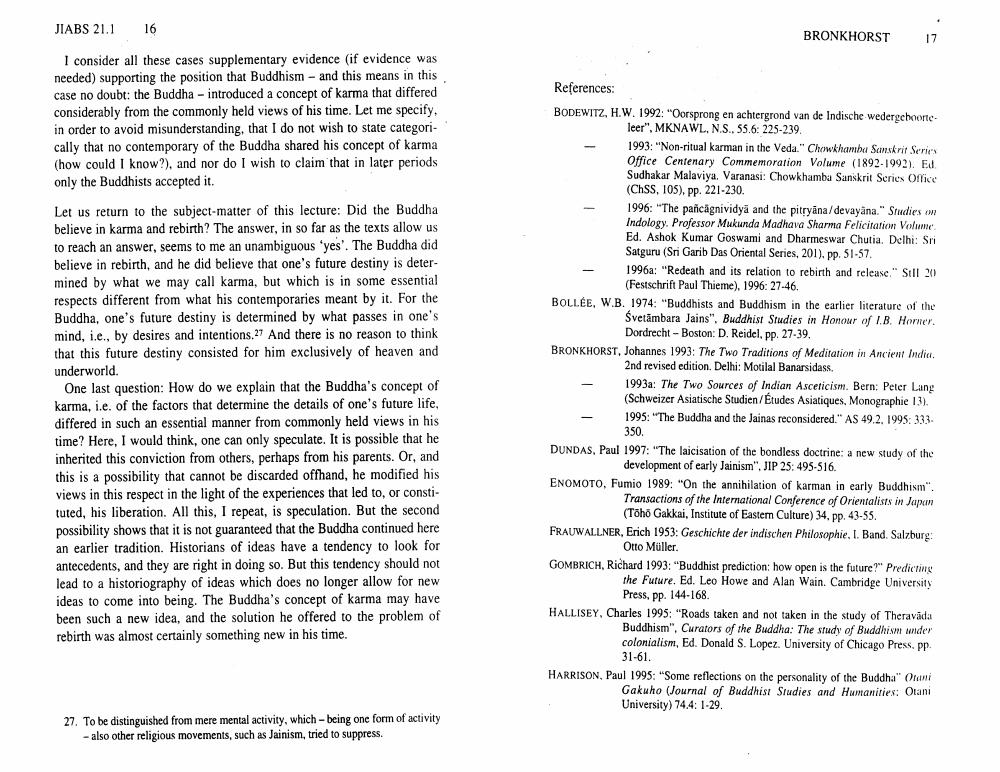Book Title: Did Buddha Believe In Karma And Rebirth Author(s): Johannes Bronkhorst Publisher: Johannes Bronkhorst View full book textPage 9
________________ JIABS 21.1 16 BRONKHORST I consider all these cases supplementary evidence (if evidence was needed) supporting the position that Buddhism - and this means in this case no doubt: the Buddha - introduced a concept of karma that differed considerably from the commonly held views of his time. Let me specify, in order to avoid misunderstanding, that I do not wish to state categorically that no contemporary of the Buddha shared his concept of karma (how could I know?), and nor do I wish to claim that in later periods only the Buddhists accepted it. Let us return to the subject matter of this lecture: Did the Buddha believe in karma and rebirth? The answer, in so far as the texts allow us to reach an answer, seems to me an unambiguous 'yes'. The Buddha did believe in rebirth, and he did believe that one's future destiny is determined by what we may call karma, but which is in some essential respects different from what his contemporaries meant by it. For the Buddha, one's future destiny is determined by what passes in one's mind, i.e., by desires and intentions.21 And there is no reason to think that this future destiny consisted for him exclusively of heaven and underworld. One last question: How do we explain that the Buddha's concept of karma, i.e. of the factors that determine the details of one's future life, differed in such an essential manner from commonly held views in his time? Here, I would think, one can only speculate. It is possible that he inherited this conviction from others, perhaps from his parents. Or, and this is a possibility that cannot be discarded offhand, he modified his views in this respect in the light of the experiences that led to, or constituted, his liberation. All this, I repeat, is speculation. But the second possibility shows that it is not guaranteed that the Buddha continued here an earlier tradition. Historians of ideas have a tendency to look for antecedents, and they are right in doing so. But this tendency should not lead to a historiography of ideas which does no longer allow for new ideas to come into being. The Buddha's concept of karma may have been such a new idea, and the solution he offered to the problem of rebirth was almost certainly something new in his time. References: BODEWITZ, H.W. 1992: "Oorsprong en achtergrond van de Indische wedergeboorte leer". MKNAWL, N.S., 55.6: 225-239. 1993: "Non-ritual karman in the Veda." Chowkhambu Sanskrit Series Office Centenary Commemoration Volume (1892-1992). Ed Sudhakar Malaviya, Varanasi: Chowkhamba Sanskrit Series Online (ChSS, 105), pp. 221-230. 1996: "The pancagnividyā and the pitryāna/devayana." Studies on Indology. Professor Mukunda Madhava Sharma Felicitation Volume Ed. Ashok Kumar Goswami and Dharmeswar Chutia. Delhi: Sri Satguru (Sri Garib Das Oriental Series, 201). pp. 51-57. 1996a: "Redeath and its relation to rebirth and release." Sell 20 (Festschrift Paul Thieme). 1996:27-46. BOLLÉE, W.B. 1974: "Buddhists and Buddhism in the earlier literature of the Svetāmbara Jains". Buddhist Studies in Honour of 1.B. Horner. Dordrecht - Boston: D. Reidel, pp. 27-39, BRONKHORST, Johannes 1993: The Two Traditions of Meditation in Ancient India. 2nd revised edition. Delhi: Motilal Banarsidass. 1993a: The Two Sources of Indian Asceticism. Bern: Peter Lang (Schweizer Asiatische Studien/Etudes Asiatiques, Monographie 13). 1995: "The Buddha and the Jainas reconsidered." AS 49.2. 1995: 333 350. DUNDAS, Paul 1997: "The laicisation of the bondless doctrine: a new study of the development of early Jainism". JIP 25: 495-516. ENOMOTO, Fumio 1989: "On the annihilation of karman in early Buddhism". Transactions of the International Conference of Orientalists in Japan (Toho Gakkai, Institute of Eastern Culture) 34, pp. 43-55. FRAUWALLNER, Erich 1953: Geschichte der indischen Philosophie, I. Band. Salzburg: Otto Müller. GOMBRICH, Richard 1993: "Buddhist prediction: how open is the future?" Predicting the Future, Ed. Leo Howe and Alan Wain. Cambridge University Press, pp. 144-168. HALLISEY, Charles 1995: "Roads taken and not taken in the study of Theravada Buddhism", Curators of the Buddha: The study of Buddhism under colonialism, Ed. Donald S. Lopez. University of Chicago Press. pp. 31-61. HARRISON, Paul 1995: "Some reflections on the personality of the Buddha" (rani Gakuho (Journal of Buddhist Studies and Humanities: Otani University) 74.4: 1-29. 27. To be distinguished from mere mental activity, which - being one form of activity - also other religious movements, such as Jainism, tried to suppress.Page Navigation
1 ... 7 8 9 10
